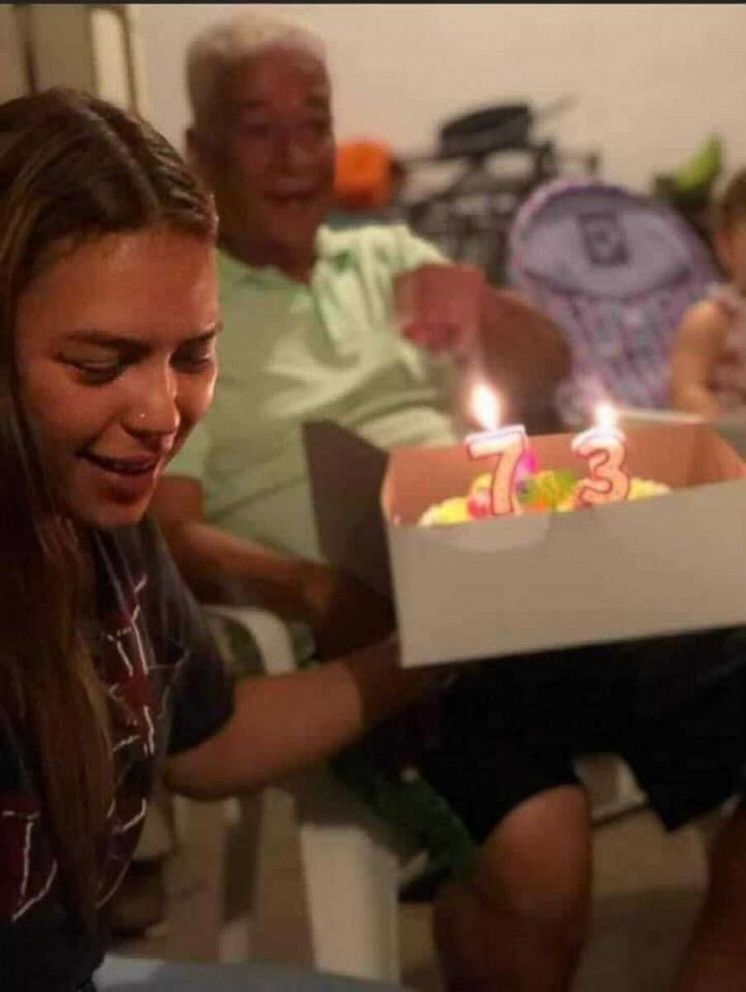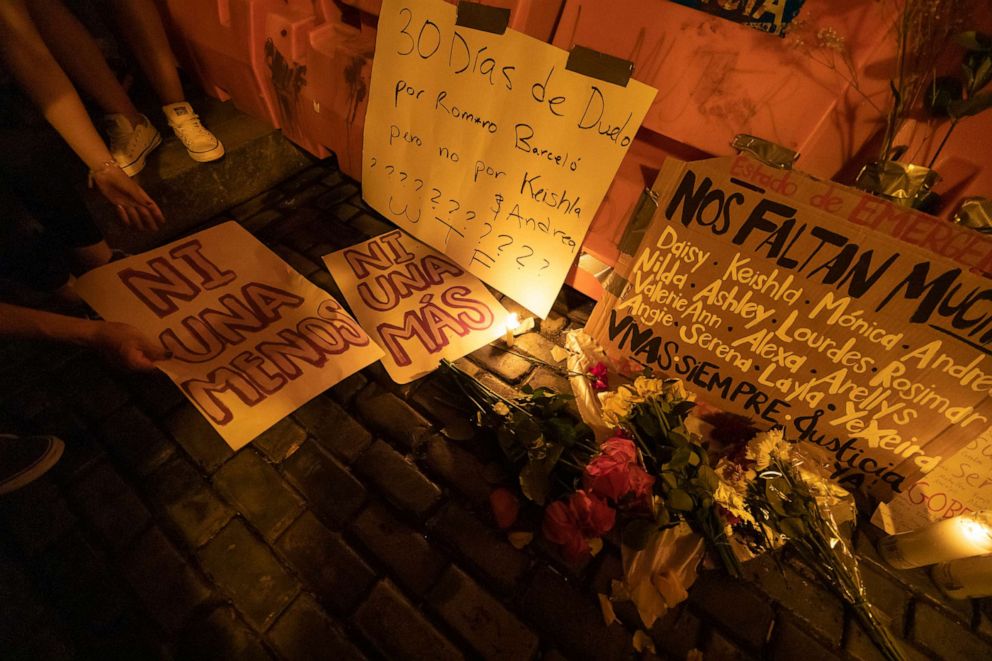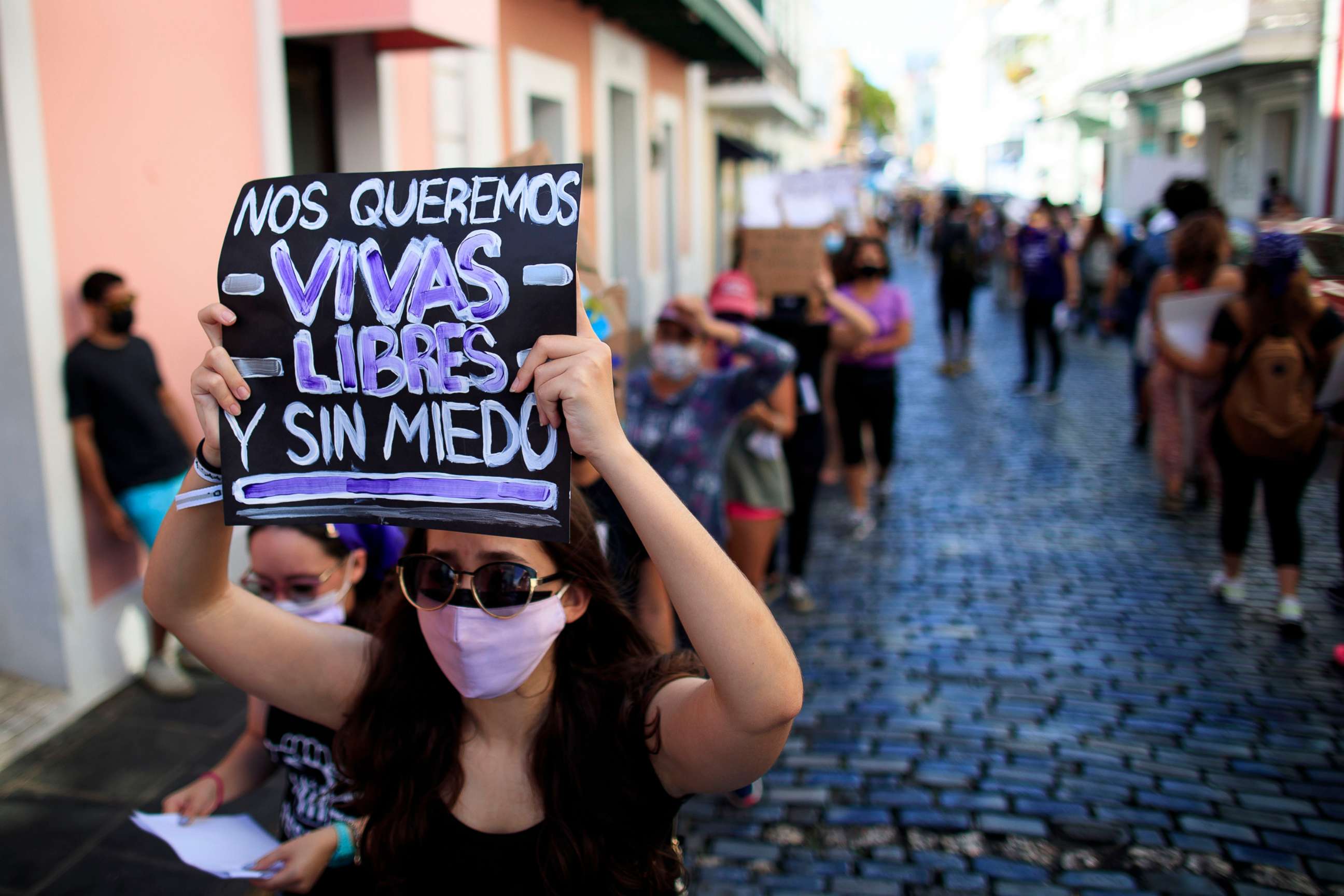Puerto Rican families devastated by gender-based killings remain concerned about government's approach to crisis
The Gender Equity Observatory reported 21 femicides in Puerto Rico.
SAN JUAN, Puerto Rico -- As gender-based killings continue to grab headlines in Puerto Rico, victims' families on the island are concerned about the government's commitment to handling the ongoing crisis.
Rosimar Rodríguez-Gómez was one of those victims. On the night of Sept. 17, 2020, she was attending her grandfather's 73rd birthday party. That night was the last time her family saw her alive.
"It's when we lose someone that we remember the others," said Marangeli Gomez, Rodríguez-Gómez's aunt. "Then they forget about it and nothing else happens."
During the birthday celebration, Rodríguez-Gómez reportedly received a text message from an ex-girlfriend asking to speak with her. After leaving the family gathering, Rodríguez-Gómez was forced into a car in front of her house, according to her family and a police report obtained by ABC News.
Rodríguez-Gómez, a resident of Toa Baja, near the capital of San Juan, was found dead 10 days after she went missing, according to the island's Forensics Science Department.

Local authorities arrested and charged Jay O'Neill-González Mercado for the kidnapping and killing of Rodríguez-Gómez, according to court records, which show he has yet to enter a plea.
O'Neill-González Mercado allegedly deceived Rodríguez-Gómez by posing as her ex-partner, writing text messages to her cellphone and requesting the location of her residence, a police report says.
The young woman's mother, Rosa Gómez, and the police report say O'Neill-González Mercado was romantically involved with Rodríguez-Gómez's ex-partner.
While there is no current date for a trial, the Gómez sisters say they are worried about gender-based violence on the island, which they say is not being addressed effectively.
"Why do we have to wait for another killing to see some action?" Marangeli Gómez told ABC News.
Alarming numbers
According to the Puerto Rico Police Bureau, there were a total of 5,517 documented incidents of domestic violence toward women from January to December 2020.
In the same year, there have been 21 gender-based murders, according to a report from Puerto Rico's Equal Gender Observatory.
In 2020, the observatory registered a total of 60 gender-based violence killings, including Rodríguez-Gómez.
On Jan. 25, 2020, the newly sworn-in governor, Pedro Pierluisi, declared a state of emergency amid the rise of gender violence. The executive order included multiple programs to handle gender violence.
However, funds requested by the island's financial oversight management board were not approved until 100 days later.

Although some say the state of emergency is a good first step, other organizations doubt the government's commitment.
"They simply yielded towards feminists' pressure," said social worker Karla Morales-Febus from the nonprofit Taller Salud, which helps people with gender violence. "Much is said, but I don't see concrete actions."
Combating gender-based violence in Puerto Rico formally dates back to 1996, when Puerto Rico established domestic violence laws acting to end impunity for domestic violence perpetrators according to the Human Rights Quarterly findings.
An investigation by GEN and Type investigations indicates that gender-based violence rose amid the crisis reported after Hurricane Maria hit Puerto Rico in 2017. The analysis concluded that in 2018, the intimate partner violence rate in Puerto Rico rose to 1.7 per 100,00 women, up from 0.77 per 100,000 in 2017.
Despite state of emergency, killings have continued
A week after funding was approved, two women were found dead on the island.
On April 29, police found the body of Andrea Ruiz Costas. After Ruiz Costas' partner was detained by police as a suspect, he came forward and confessed the crime, according to authorities.
That same day, Keishla Rodríguez Ortiz was reported missing by her family members. Her body was found three days later in the San Jose Lagoon in San Juan after she was allegedly killed by Olympic boxer Félix Verdejo-Sánchez. Verdejo-Sánchez was charged with kidnapping resulting in death, carjacking resulting in death and killing an unborn child, according to the Department of Justice. Verdejo-Sánchez pleaded not guilty.
Both deaths outraged Puerto Ricans, leading to days of protests pushing for concrete change and action from every sector of the island.
When Rodríguez-Gómez's family heard about both deaths, they said their hearts broke once again.
"It's like reliving it all over again," Rosa Gómez told ABC News.
Pushing for more efforts
Sheila Angleró, a spokesperson for the governor, told ABC News that Pierluisi has "the highest commitment in fighting gender violence."
"The governor has reiterated that gender violence is a complex problem that requires solutions and diverse strategies. We need to work with multiple sectors and with education, police, justice, mayors, communities, among many more. That's precisely what the PARE Committee has been working on," Angleró said in a statement, referencing a committee of organizations that work with gender violence and government officials that was created with the state of emergency.
Despite these efforts, people on the ground have been noting challenges and pushing for more from the government.
One of the organizations that is part of the committee told ABC News earlier this month that there are some hurdles groups have been facing, including delays in the handout of official documents by gubernatorial agencies, which makes it difficult to complete their action plan.

Both Gómez sisters would like to see the government work to prevent this type of violence in the first place.
"Education in schools is key. We have to teach our children morals and values," Rosa Gómez said.
Morales-Febus said multiple programs have to be implemented at a state level, including adding a gender-perspective curriculum in schools.
"Gender perspective is a vital thing for the education of the people in the island. It would help educate kids on how to identify that type of violence and how to raise their voice at home, in school or other places," she said.
Pierluisi said the government is planning on implementing a gender-perspective curriculum in all public schools starting in August 2021.
'We are the only ones making the calls to seek justice'
Still, Morales-Febus said the government is not doing enough.
"There are no preventive measures coming from the government nor the state. It's all falling under organizations like ours that work with the security of our women looking for ways to raise awareness and our voices," she said. "We are the ones executing the educational work."
This includes a special event and vigil Taller Salud, the organization she works with, held this week to protest, demand justice and remember the victims.

The Gómez sisters said the lack of support they're feeling from the government is disappointing and frustrating.
"There is no follow-up from the government in regards to our case. ... We are the only ones making the calls to seek justice," Rodríguez-Gómez's aunt told ABC News.
While organizations keep working on pushing for change and helping those who are still suffering from gender-based violence, victims' families are also in the process of finding peace and closure.
"I just want justice for my daughter," Rosa Gómez said through tears.
Editor's note: This story has been updated to clarify O'Neill-González Mercado's relationship with Rodríguez-Gómez.




